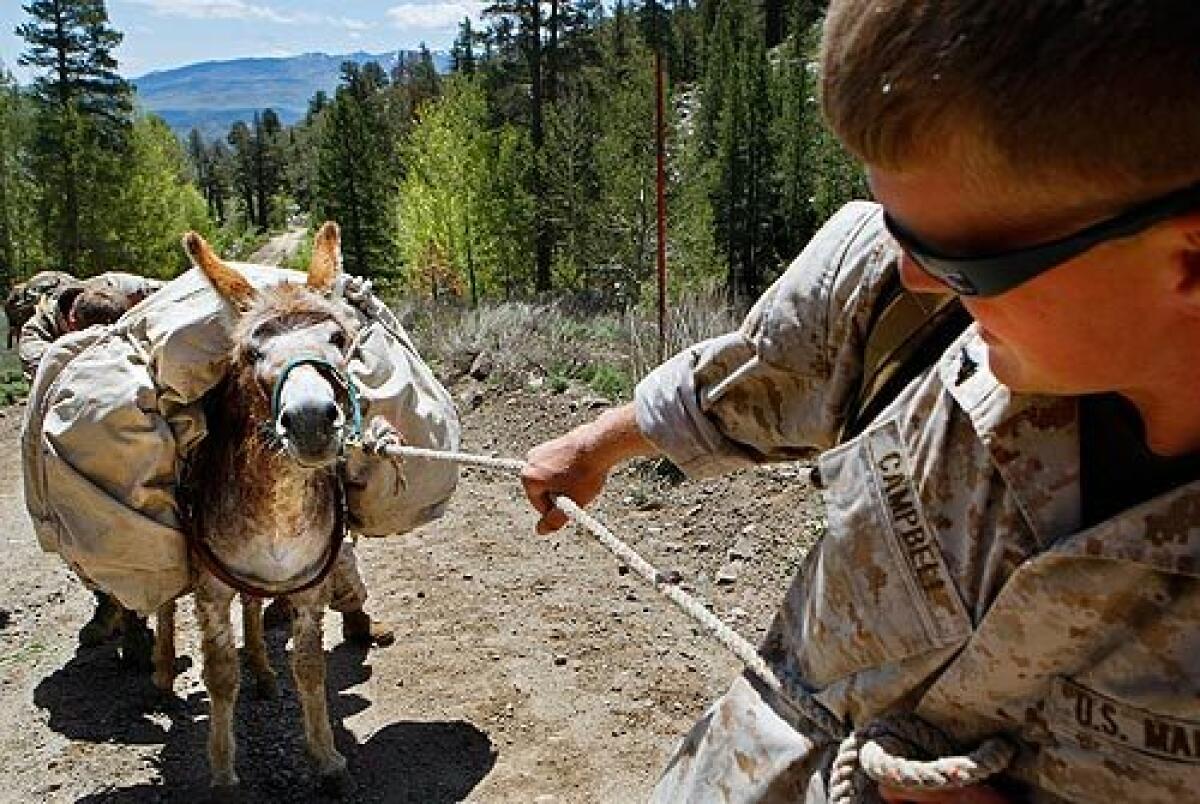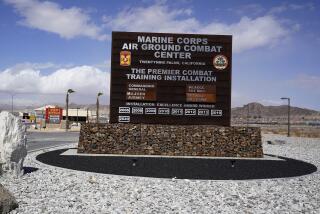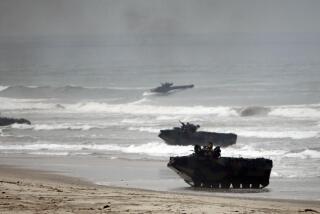Marines’ beasts of burden are again leading the pack

Reporting from Bridgeport, Calif. — With 75 pounds of military gear cinched on her furry back, Annie was stubborn the whole way.
The two Marines assigned to her pushed, pulled and sweet-talked her up the steep, twisting trail on the eastern side of the Sierra Nevada.
“C’mon, girl, you can make it,” Lance Cpl. Chad Campbell whispered in her ear.
“Only one more hill,” promised Lance Cpl. Cameron Cross as he shoved Annie’s muscular hindquarters.
The red-hued donkey snorted, nibbled on grass and let loose that distinctive braying, which begins with a loud nasal inhalation and concludes with an even louder blast of deep-throated protest.
She also dropped green, foul-smelling clumps, which the Marines carefully sidestepped.
On the rocky, uneven path, Annie never stumbled. A good donkey, Marines say, knows three steps ahead where it wants to walk.
For Campbell and Cross, the day with Annie could be a preview of days to come. The two may soon deploy to Afghanistan, where donkeys and mules have been the preferred mode of military transport for centuries -- and remain so.
With the U.S. shifting its focus from the deserts of Iraq to the mountains of Central Asia, this course on pack animals at the Marine Corps Mountain Warfare Training Center has become critical to the new mission.
Opened in 1951 to train troops for Korea, the center -- with its administrative buildings, barracks, corrals and an enormous tent for visiting troops -- is set on 47,000 acres of the Humboldt-Toiyabe National Forest, where serrated peaks above 10,000 feet are the perfect terrain to teach high-altitude combat skills.
Five donkeys, 24 mules and five sergeant trainers are stationed at the center for the course, which is given eight times a year to Marines, Army soldiers, Navy SEALs and some foreign troops.
Humvees and even helicopters are of limited use in Afghanistan’s mountains. There are few roads and the air is thin. But a 1,000-pound mule or 400-pound donkey can easily carry a load one-third its weight -- or more, if necessary.
The weapons of war have changed, but the basics of handling donkeys and mules -- like the sawbuck saddle and packs on Annie -- are not much different from how they were in the time of Genghis Khan.
“It’s a very primitive way to carry very modern weapons,” said Sgt. Joe Neal, one of the instructors. “But it works.”
On the first day of the 12-day course, Campbell, Cross and 40 other junior Marines, all from Camp Pendleton, listened intently at the corral in Pickel Meadows as instructors spoke of battles won with the help of four-footed allies.
One of the Marine Corps’ most fabled heroes, Sgt. Maj. Daniel Daly, earned his second Medal of Honor for leading pack animals into combat against Haitian bandits in 1915.
Assigned one of the older, scruffier mules, two of the Marines later insisted the animal must have deployed with Daly.
The students learned to pack machine guns, mortars, grenades, Javelin missiles and M-16 ammunition, as well as food, water and medical supplies -- all needed to carry the fight to the enemy.
“The Taliban are born mountain men, they can move faster in that terrain than we can,” said Staff Sgt. Tyler McDaniel, an Iraq war veteran who is now the lead instructor for the course. “The pack animals are a force multiplier. They make sure we can get enough gear and men to the fight.”
For some of the Marines here, animals were part of their upbringing. “I’m used to breaking horses, but I’m not used to packing mules,” said Pfc. James Moody, 19, of Zavalla, Texas.
But others had no experience. “This is all new to me,” said Cpl. Bradley Neuenburg, a 20-year-old computer buff from San Rafael in Northern California. “I’m more used to basic syntax, binary language and codes.”
In the beginning, some were tentative with the animals, leery of being kicked and reluctant to take charge. Instructors prowled around the corral as the two-man teams struggled.
“Pull that rope tight,” Sgt. Graham Golden told Neuenburg in a voice loud enough to be heard by others having the same difficulty. “You’re not going to hurt the mule, and otherwise that load is going to fall off up the mountain.”
After several days of learning to handle rope, tie knots and hitches, and pack and balance loads, the students were graded on the knots -- and their demeanor around the animals.
“It’s a dying skill that we need to revive,” said Sgt. Jerry Meece, 35, a lean, slow-talking native of Lufkin, Texas, who was a rodeo bull rider for a dozen years before enlisting.
The animal packers course dates to the 1980s, when the CIA sent operatives here before they were dispatched to help the Afghans fight the Soviet occupation force. The agency bought several thousand mules for the Afghans to maintain supply lines.
When they reach Afghanistan, the Marines probably will work with donkeys, which are cheaper and more common. A good donkey can be had there for $5.
As the Marines prepared for their first “hump” up the mountain, instruction was intense, laced with an obscenity that is integral to military patois. Golden spotted Pfc. James McGuckin, an 18-year-old from Staten Island, curling a rope around his hand and forearm like a suburbanite wrapping a garden hose for storage.
“Is that the way I taught you to handle ropes?” he bellowed, slamming his clipboard to the ground. “Pay attention to detail! Are you a [expletive] Marine or in the [expletive] Army?”
In combat, said Golden, 27, of Ferndale, Ark., any deviation from training can get Marines killed.
McGuckin froze to attention and carefully placed the rope on the ground. Other Marines watched wordlessly -- seemingly relieved it was someone else who was the object of their teacher’s ire.
Later, as he waited in line at the chow hall, McGuckin said he did not mind being bawled out. “Someday, when we’re in a fight, we’re going to need those animals and those ropes,” he said.
The trek up the mountain to a grassy meadow the Marines call LZ (Landing Zone) Penguin came on the fourth day. The rain of previous days had abated, and only a few clouds shielded the Marines and the animals from bright sunshine.
The Marines and animals trudged for more than three hours and three miles up narrow, rock-strewn trails, a climb of about 1,000 feet in altitude.
More arduous journeys would follow in the next eight days. One would test the Marines’ ability to use their animals to retrieve U.S. injured and dead from a helicopter crash, with 200-pound dummies called Rescue Randys as faux casualties.
The mules were purchased by the Marines from an outfitter in Montana. The donkeys were rounded up by the Bureau of Land Management from its vast acreage.
The mules -- bigger, sleeker and more cooperative -- led the single-file procession. The donkeys were in back. The Marines devised different strategies for their maiden convoy.
Lance Cpl. Usay Vue, 25, of Fresno, put apples from the chow hall in his backpack. His mule, Gray, could smell the fruit and nosed the pack. He seemed to be imploring Vue with a longing look in his brown eyes.
As they waited in the corral for the order to move out, Vue gave in and fed the mule a slice.
“You be good to me,” he whispered in the animal’s ear, “and I’ll feed you more later.”
Vue’s partner, Pfc. Tony Chan, 20, of Queens, N.Y., found that their apple system worked well -- maybe too well. Gray wanted to move faster than the column. “He was trying to motivate me, I guess,” Chan said.
Pfc. Ilya Ward and Lance Cpl. John Fisher designed a buddy system. One would take the reins while the other ran ahead to rip up clumps of grass to feed their donkey, Jimmy.
“It’s a way to keep Jimmy motivated,” said Ward, who rode horses in his native Siberia.
On those half a dozen occasions when Annie refused to budge, Campbell and Cross stuck to the dictum drilled into them: Donkeys do not respond well to rough treatment or harsh language.
Sgt. Chad Giles sat on his horse and watched the two 20-year-olds coax and cajole Annie. He urged persistence but admonished against rude language, saying they should talk to her as they would a woman they loved.
Another Marine had trouble summoning up patience as his brownish donkey refused to move, braying its discontent and threatening to bring the convoy to a halt.
“I got the absolute worst [expletive] one of all,” cried Pfc. Patrick Burree, 22, of Santa Barbara.
Giles, 25, of Provo, Utah, was not sympathetic. “I told you not to talk to her like that,” he said, shaking his head in one of those “some people never learn” gestures.
After a short rest, the donkey moved on its own.
The final push, to about 8,000 feet, was through a grove of pine trees to a meadow the size of several football fields, with a small stream, shade trees and an abundance of sweet grass. A snow-capped peak loomed in the distance.
For the donkeys and the mules -- bred for strength and stamina -- the size of their loads and the steepness of the terrain were no problem. For the Marines, each with a 30-pound pack, they were.
Many were winded and flushed.
“She’s OK, but I could be better,” admitted Campbell, scratching Annie’s chin and patting her sides.
“We wanted a challenge and we got what we asked for,” Cross said.
Campbell, of Pleasant Hill, Mo., and Cross, of Altus, Okla., were pleased they had passed the first test. Campbell let Gus, a friend of Annie’s, take a bite of an apple -- and then took a bite himself.
“A little bit of donkey slobber never hurt nobody,” he said.
Marines rested; animals grazed. The march down would be quicker, easier.
“Now we know we can do it,” Cross said, “even when you get a stubborn one.”
More to Read
Sign up for Essential California
The most important California stories and recommendations in your inbox every morning.
You may occasionally receive promotional content from the Los Angeles Times.










